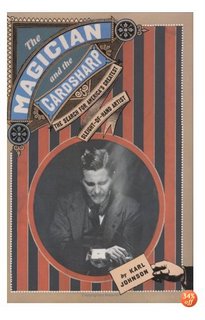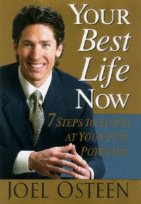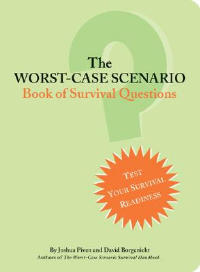1. I'm at the local public library and pick up a book that tickles my fancy, wherever said fancy may be.
2. I'm anywhere else -- at a bookstore, or maybe reading a publication, or online -- and I come across a book title that may or may not tickle the aforementioned fancy. Then I search for the title in the library's vast database and, if found, reserve a copy. If not, I wait a few weeks and try again.
My reading pattern is library-based for a simple reason: I'm more likely to crack open and finish a book if there's a return date involved. I have many interesting books I've purchased that sit there on my bookshelf, unread, because there's no deadline when it comes to outright ownership.
Now this doesn't mean I vigilantly read everything I check out. Indeed, I probably finished half of them. But I like having the option of knowing I could have read the others, if I were so inclined. This may make me a lazy reader, but I'm still a reader safely within a tight budget.
As with movies, ranking the books I read would prove pointless. What I enjoyed a few months ago might be something I wouldn't be in the mood to read now. (I'd venture to say that I would read The Game, Harry Potter and the Half-Blood Prince, and Assassination Vacation again.) So instead I'll cop out and provide a brief roundup of books I've read but never got around to reviewing:
 The Magician and the Cardsharp, by Karl Johnson: This is one of those titles I read about in a magazine. It tells the story of a Canadian-born illusionist (not too famous, more of a magician's magician) who takes an almost quixotic journey to the American Midwest, hellbent on confirming an urban legend about a cardsharp who can seamlessly deal from the center of the deck. I got through about half of it, thoroughly charmed by the vintage photos of the era, when I suddenly decided to flip to the cover spine to read the library call number. Lo and behold, this was nonfiction. I'm not sure if this makes me like the book more or less: many of the supporting characters are of tall-tale caliber, and the mix of real people of the era made me only want to believe it was true.
The Magician and the Cardsharp, by Karl Johnson: This is one of those titles I read about in a magazine. It tells the story of a Canadian-born illusionist (not too famous, more of a magician's magician) who takes an almost quixotic journey to the American Midwest, hellbent on confirming an urban legend about a cardsharp who can seamlessly deal from the center of the deck. I got through about half of it, thoroughly charmed by the vintage photos of the era, when I suddenly decided to flip to the cover spine to read the library call number. Lo and behold, this was nonfiction. I'm not sure if this makes me like the book more or less: many of the supporting characters are of tall-tale caliber, and the mix of real people of the era made me only want to believe it was true. Next was Sexual Intelligence, sort of an amateur treatise by actress and author Kim Cattrall. (As you may guess, this book fell in the first category.) I never read her first book, Satisfaction: The Art of the Female Orgasm, mostly because it was always wrapped in plastic in the bookstores. (My loss, I believe, particularly when it comes to my social life.) This book is sort of a pictorial history of sex as perceived by ancient cultures, merged with modern-day opinions of people from all walks of life. I'm sure she meant well, but the book comes across as a bit of a messy hodgepodge. I keep remembering weird photos of the author posed provocatively near centuries-old phalluses.
Next was Sexual Intelligence, sort of an amateur treatise by actress and author Kim Cattrall. (As you may guess, this book fell in the first category.) I never read her first book, Satisfaction: The Art of the Female Orgasm, mostly because it was always wrapped in plastic in the bookstores. (My loss, I believe, particularly when it comes to my social life.) This book is sort of a pictorial history of sex as perceived by ancient cultures, merged with modern-day opinions of people from all walks of life. I'm sure she meant well, but the book comes across as a bit of a messy hodgepodge. I keep remembering weird photos of the author posed provocatively near centuries-old phalluses. Perhaps on the other end of the moral spectrum is Your Best Life Now by Joel Osteen. It's a highly accessible combination of Christianity and self-help at a time when an unhealthy chunk of Americans could use equal doses of both. (I was prepared to write a review a few months back and call it "Rev. Phil," but I never got around to it.) Joel Osteen is a Houston-based clergyman with a stadium-sized congregation and a nationally syndicated sermon. My parents used to watch it on PAX, the only clear channel we received back in rural North Carolina. (It helped that he told a joke in the first few minutes, and displayed an Indian flag in the background.) He's successful because he's spiritually inclusive in his speeches, which is refreshing to those of us who aren't Christian but also don't dismiss the entire religion as worthless. The book is a natural extension of his beliefs, and while it lacks teeth, it is well-organized and easy to follow. I don't necessarily agree with what I had read, but it does no real harm to society for those readers who choose to follow his instructions to the letter.
Perhaps on the other end of the moral spectrum is Your Best Life Now by Joel Osteen. It's a highly accessible combination of Christianity and self-help at a time when an unhealthy chunk of Americans could use equal doses of both. (I was prepared to write a review a few months back and call it "Rev. Phil," but I never got around to it.) Joel Osteen is a Houston-based clergyman with a stadium-sized congregation and a nationally syndicated sermon. My parents used to watch it on PAX, the only clear channel we received back in rural North Carolina. (It helped that he told a joke in the first few minutes, and displayed an Indian flag in the background.) He's successful because he's spiritually inclusive in his speeches, which is refreshing to those of us who aren't Christian but also don't dismiss the entire religion as worthless. The book is a natural extension of his beliefs, and while it lacks teeth, it is well-organized and easy to follow. I don't necessarily agree with what I had read, but it does no real harm to society for those readers who choose to follow his instructions to the letter. Finally, we have The Worst-Case Scenario Book of Survival Questions, by Joshua Piven (no relation to Jeremy, as far as I can tell) and David Borgenicht. I've enjoyed their past manuals -- they make great gifts if you expect the offbeat -- and this book takes the teachings a step further, placing the reader in precarious situations and making the reader decide what to do. Curiously, there often was no right answer, but just semi-right answers with corresponding pitfalls should the reader choose them. In that respect it reminded me of the bar exam. Still, this is the kind of book that works better as a sit-down read; you couldn't, say, fashion a parlor game with your friends out of it.
Finally, we have The Worst-Case Scenario Book of Survival Questions, by Joshua Piven (no relation to Jeremy, as far as I can tell) and David Borgenicht. I've enjoyed their past manuals -- they make great gifts if you expect the offbeat -- and this book takes the teachings a step further, placing the reader in precarious situations and making the reader decide what to do. Curiously, there often was no right answer, but just semi-right answers with corresponding pitfalls should the reader choose them. In that respect it reminded me of the bar exam. Still, this is the kind of book that works better as a sit-down read; you couldn't, say, fashion a parlor game with your friends out of it.
No comments:
Post a Comment